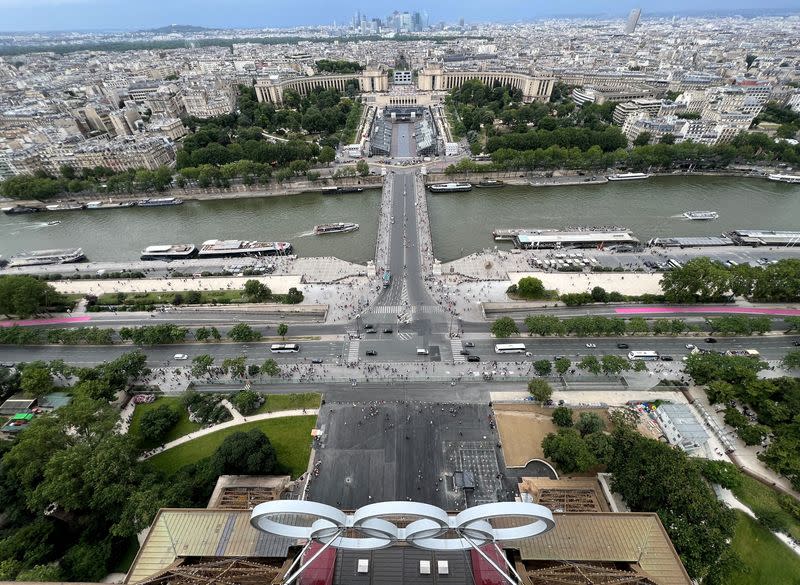Explainer-When are the 2024 Olympics and how is France preparing?

PARIS (Reuters) - Here is everything you need to know about the Paris 2024 Olympics: the dates, the venues, the opening ceremony, new sports and security issues.
WHEN ARE THE OLYMPIC AND PARALYMPIC GAMES?
The Paris 2024 Olympics will run from July 26-Aug. 11, while the Paris 2024 Paralympics will be held from Aug. 28-Sept. 8.
WHERE WILL THE GAMES TAKE PLACE?
In September 2017, the International Olympic Committee awarded Paris the 2024 Games when its only remaining rival, Los Angeles, agreed to wait another four years to be the host city.
Paris has hosted two Olympics and will stage the event 100 years after its last Games in 1924.
The Games will be staged in 35 venues across Paris, Ile-de-France, mainland France and overseas.
Some notable venues are the Eiffel Tower Stadium (beach volleyball), Parc des Princes (soccer), Roland Garros Stadium (boxing and tennis), Stade de France (athletics and rugby sevens) and Teahupo'o in Tahiti (surfing).
WHICH NEW SPORTS WILL DEBUT IN THE PARIS 2024 OLYMPICS?
Breaking, a competitive form of breakdancing that blends artistry and dance with acrobatic moves, will debut at the Paris 2024 Olympics.
Having made its Olympic debut at Tokyo 2020, karate was absent from the four sports organisers recommended for the 2024 Summer Games. Baseball-softball has also been dropped as a sport for Paris 2024 but will return at Los Angeles 2028.
WHEN IS THE OLYMPIC OPENING CEREMONY AND WHAT WILL IT BE LIKE?
The Paris 2024 Olympics opening ceremony will start at 7:30 p.m. (1730 GMT) on July 26.
Instead of a traditional opening ceremony in a stadium, France has planned a river parade along 6 km (4 miles) of the River Seine, ending at the foot of the Eiffel Tower.
Some 300,000 spectators will watch from the banks of the Seine as a global audience tunes in on television.
WHAT ARE THE SECURITY RISKS AND HOW COULD THEY IMPACT THE OPENING CEREMONY?
Conflict in the Middle East and Ukraine, as well as the threat of an attack, have led the French government to raise its security alert to its highest level this year.
Around 45,000 French police and security forces will secure Paris during the Games, with additional help from a few thousand foreign security officials.
France will deploy 35,000 security agents and the military to secure the opening ceremony from security threats, including drone strikes, Interior Minister Gerald Darmanin said in May.
France has prepared alternatives to holding the Olympics ceremony on the Seine should security reasons require it, President Emmanuel Macron said in April.
One option, Macron said, would be to restrict the ceremony to the Paris Trocadero square facing the Eiffel Tower, while another would be to move it to the Stade de France stadium.
The Kremlin has rejected assertions that Russia would malevolently target the Olympics, calling them absolutely unfounded.
IS RUSSIA TAKING PART IN THE PARIS 2024 OLYMPICS?
Following Russia's invasion of Ukraine in February 2022, the IOC initially recommended a ban from international competitions of athletes from Russia and its ally Belarus, but it has since allowed them to qualify as neutrals.
Each qualified athlete is undergoing a vetting process by a three-member panel appointed by the IOC to ensure they meet certain eligibility criteria. Not having actively supported the war in Ukraine and not having been contracted to any military or security agency are among the criteria.
Russian and Belarusian athletes cannot take part in team competitions but are allowed to participate as neutrals - without flags or anthems being played and will be excluded from taking part in the opening parade.
Russia has denounced the restrictions as discriminatory and accused the IOC of taking part in a "conspiracy" with Ukraine.
The Russian Olympic Committee has paid compensation to 245 athletes who failed to meet the criteria allowing them to compete, the RIA state news agency reported.
(Compiled by Pearl Josephine Nazare in Bengaluru; Editing by Alison Williams)

 Yahoo News
Yahoo News 
